Child development stages: Ages 1-5 the early years
Child development stages: Ages 1-5 is a tricky time, here we look at everything from walking and talking to starting school...
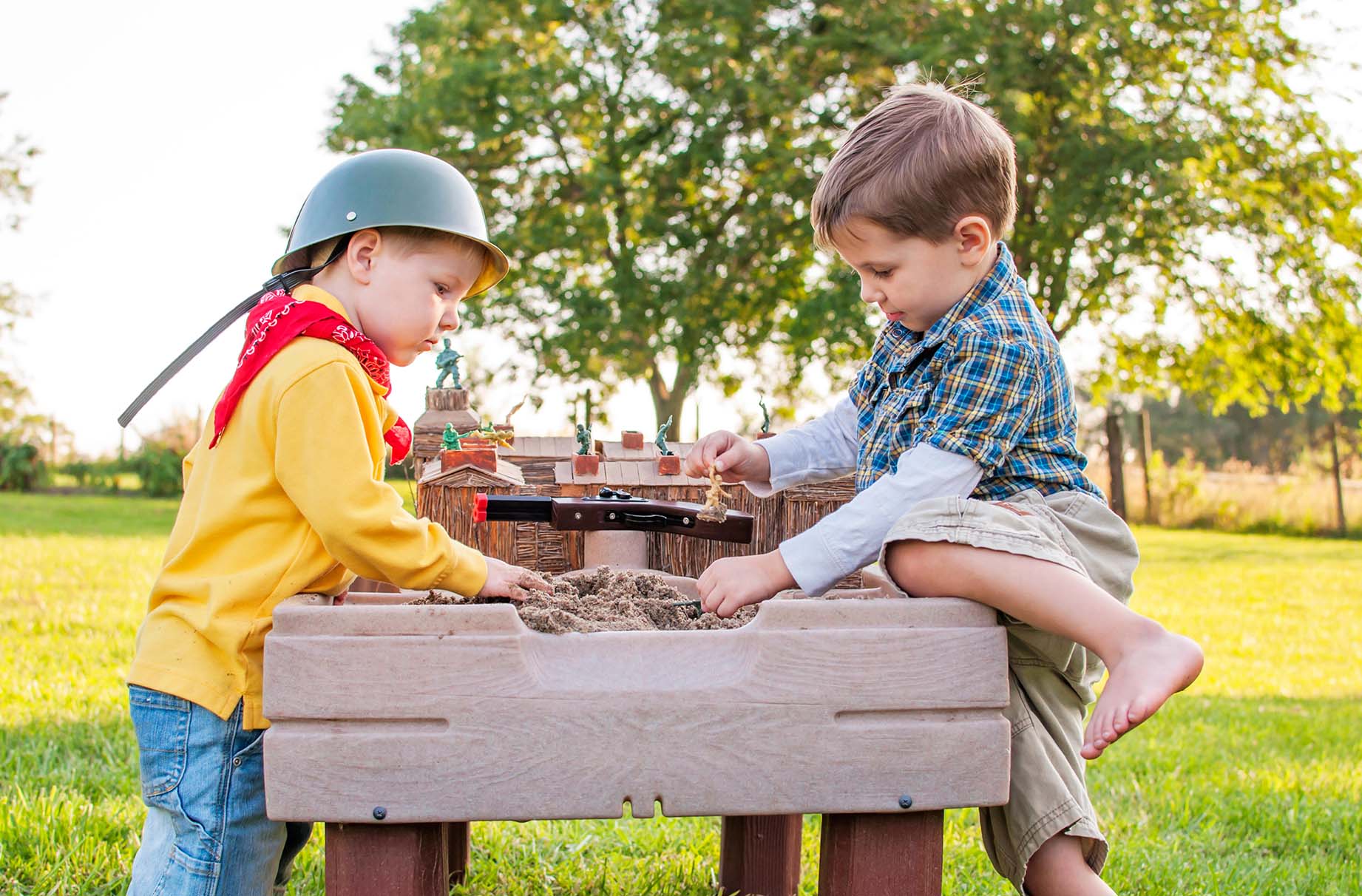
When it comes to child development stages: ages 1-5, you're going to want as much information as possible - forewarned is forearmed.
Yep, these child development stages: ages 1-5 can be tricky, there's just so much learning and growing going on in your little one's life.
And, although all children develop at their own pace, there are commonly accepted milestones during the child development stages: ages 1-5 which give you an idea of your child's progression, in areas as diverse as communication, physical growth, social skills and learning.
Child development stages: Age one Child development stages: Age two Child development stages: Age three Child development stages: Age four Child development stages: Age five
It's important to note that the milestones mentioned in the child development stages: Ages 1-5 are averages. And that development can be affected by a number of genetic and environmental variables, so there's no need to panic if your child hasn't met with all of the stages listed below.
If you have any strong concerns about your child during the child development stages: ages 1-5, speak to their doctor for further tests and advice.
Child development stages: Ages 1-5
Child development stages: Age one
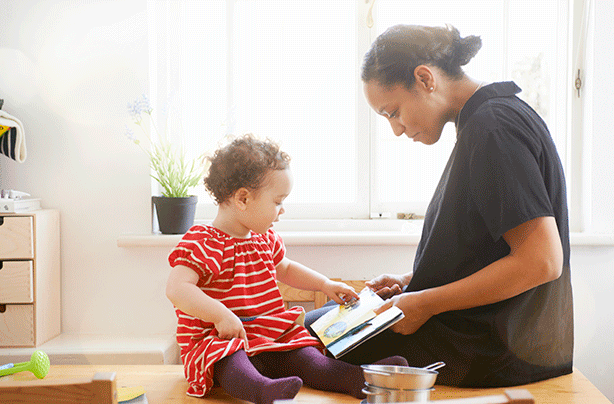
Most parents during the child development stages: ages 1-5 their child's first birthday as an important milestone as it marks the transition from baby to toddler.
Parenting advice, hot topics, best buys and family finance tips delivered straight to your inbox.
Your child will go through a period of rapid development in the 12 months between their first and second birthday - and parents usually can't wait for their little one to learn to walk and talk. But remember that children develop at their own pace, so try not to compare your child with others.
'Most children will take their first steps and say their first words by the time they are 18 months old,' says Geraldine Butler, who is a health visitor and author of Teach Yourself Successful Potty Training.
'Whether they are bottom shuffling, crawling or walking, many children will be mobile by their first birthday. This is the time to think about home safety, so that your child won't come to any harm as they explore your home.'
Physical changes
While you can expect your child to go through some dramatic physical developments during the child development stages: ages 1-5, it's really the first 12 months the biggest changes happen.
As they learn to walk, run and climb stairs. Improved muscle strength and balance mean that your child will probably be able to stand unsupported for a few moments soon after their first birthday.
Around this time they will also learn how to pick up small objects between their thumb and index finger. This is known as the 'pincer grip' and will make it possible for your child to feed themselves, scribble with a crayon and build towers of blocks
Communication
Most children, at this stage of the child development stages: ages 1-5, will be able to use one or two words by their first birthday, 6-20 recognisable words by the time they are 18 months old, and will have a vocabulary of around 50 single words by the time they turn two.
Around this time, they may also start to put two words together, such as 'Daddy work.' As understanding develops before speech, your child will probably be able to follow simple commands from the age of 12-18 months.
Emotional development
Your child needs lots of love and affection to make them feel happy and secure throughout the child development stages: ages 1-5 They are likely to have several close attachments - to their parents, grandparents and perhaps a trusted childminder.
Despite this, many children struggle with your absence - and this can mean anything from returning to work, to going out for a few hours or even leaving the room for a minute or two.
This separation anxiety usually peaks at around 18 months, but it can continue beyond this, so be sure to give your child lots of attention until they adjust.
Learning
Young children learn though play, so it's important to give them lots of time to do this - even if it means repeating the same activity over and over again.
Don't be surprised if your toddler rejects expensive or complicated toys in favour of simple household objects.
Banging on pots and pans, shaking containers filled with dried rice, pasta or beans or playing with building blocks or stacking cups can improve their ability to handle small objects and teach them about everything from sounds and colours to shapes and textures.
Social skills
The typical one year old is happiest with his or her parents, and can be shy around strangers or people that they don't know well. Even more outgoing and confident children will look to your for comfort and reassurance, particularly in new or unfamiliar situations.
As your child approaches their second birthday, they will start to show more interest in other children. However, don't be surprised if your child isn't keen on playing with other children straight away. It can take time to get used to being around others, particularly if your child is shy.
Challenges
Many children struggle with teething between the ages of one and two. This can lead to disturbed sleep and can create problems with food if your child has a sore mouth.
If your child seems to be struggling, use teething gel or Calpol to ease any discomfort, and offer strips of chilled cucumber to help soothe their sore gums.
How to help
Children go through so many changes between their first and second birthdays that they will benefit from a good routine to help them feel safe and secure. Don't feel you have to set too many strict rules, but a simple bath, book and bed routine can help to prepare your child for a good night's sleep.
Child development stages: Age two
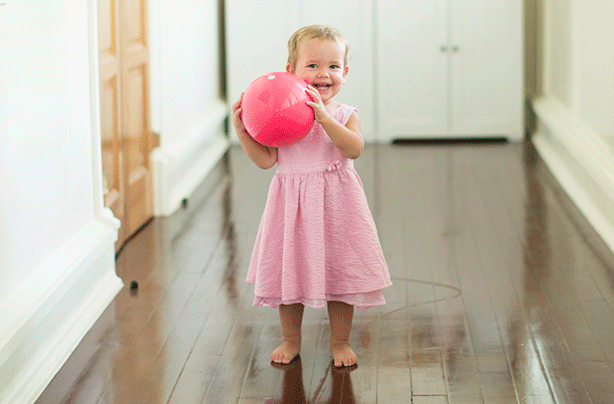
Most parents dread the 'terrible twos' and worry about how they will deal with the tantrums that often begin before their child's second birthday. It can be hard to adjust to your child's dramatic mood swings, but try to remember they need you more than ever as they go through a period of overwhelming physical and emotional changes
'Most parents decide to start potty training their child between their second and third birthdays,' says Laverne Antrobus, author of 'Ain't Misbehavin'. 'The average age is around 33 months, but some children will be ready sooner, and some won't be interested for a while longer. If your child isn't ready, then don't push it - and don't worry about it. Remember that it's not a race and they will get the hang of it sooner or later.'
Physical changes
Now that your child has been walking for a few months, you will notice that they are much more steady on their feet and can also run and jump. Over the next few months their coordination will improve and you will find that they manage to handle smaller objects, open doors and may even try to dress and undress themselves.
Communication
There is a great deal of variation in speech between children aged between two and three. Some children will be talking in five or six word sentences - others will be saying just a few words here and there.
Check with your health visitor if you are concerned, but provided that you and your child understand each other reasonably well, there is probably no need to worry.
Emotional development
At the age of two, children begin to express a wide range of emotions, so prepared for dramatic mood swings as they learn how to manage their feelings. They will need your help to make sense of how they are feeling.
When they are able to explain what they want and how they are feeling, tantrums should become less frequent.
Learning
Your child will now have a better understanding of the passing of time and an improved memory. They will be able to remember what happened days or weeks before - so may show a clear preference for favourite games or particular ways of doing things. As they approach their third birthday, most children will know their full name, and will probably be able to point out images in books and may be able to draw circles, lines and dots.
Social skills
Your two year old will become increasingly interested in playing with other children, although you may need to help them get started. At first they will prefer to play alongside other children, perhaps copying what they are doing. You will need to show them how to share and take turns, so should stay close by to supervise. Don't be surprised if playtimes end in tears, as it will take a while for your child to adjust.
Challenges
Tiredness is at the root of many behavioural problems, so make sure that your child gets around 12 hours sleep each day, including a daytime nap. If your child has trouble sleeping, ask your health visitor for advice on techniques to help them get the rest they need.
How to help
Your child thrives on your love and attention, so commit to spending 10 minutes each day giving them your full attention. Play with them, talk to them or look at books without any distractions. Remember to follow their lead and offer lots of encouragement.
Child development stages: Age three
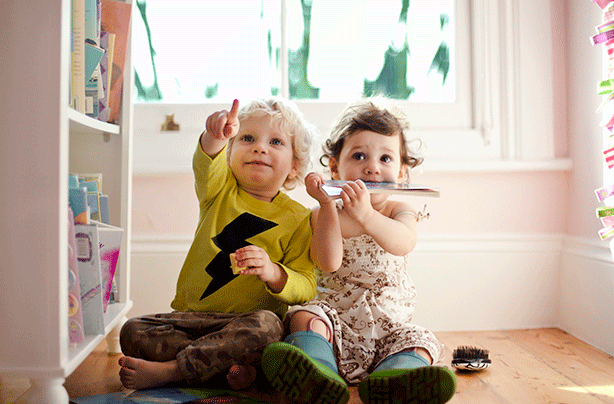
After their third birthday you will notice that your child is becoming increasingly independent. As they try to make sense of the world around them you will be asked lots of questions. They will also begin to develop a sense of right and wrong, and will be desperate for your praise and approval.
'By the age of three, children want to do things their own way,' says Rachel Morris, author of The Single Parent's Handbook. 'This can be hard for parents, as it means that your child won't always do as they're told.
Try to stay calm and remember that they're not being deliberately naughty - they are just beginning to understand that they are a person in their own right, with their own wants and needs.'
Physical changes
You should be able to tell if your child is left or right handed sometime between their third and fourth birthdays. Up to this point, most children can use both hands, but they should now begin to show a clear preference.
The development of large muscle groups means that your child can now master activities like climbing, pedalling a tricycle or using a scooter. The development of small muscle groups, along with improved hand-eye coordination, means that your child will begin to hold a pencil well, and may be able to draw recognisable pictures.
Communication
Your child's language skills will be improving every day, and many children can now speak in short sentences. This is a good time to introduce your child to letters and sounds, although you should keep the focus firmly on fun and don't put them under any pressure to learn.
Don't be alarmed if your child starts telling lies, particularly if they have done something naughty. This is perfectly normal, and is a sign that they are learning about reality and fantasy. If they do tell a lie, you should deal with it immediately - but don't get angry, just make it easy for them to tell you the truth.
Emotional development
Your child is now much more aware of other people's feelings. As a result you will probably notice that your child is keen to make you happy, and is likely to start to show more consideration towards others.
This will be most noticeable when they are playing with other children. You might, during this stage of the child development stages: ages 1-5, also notice your child trying to comfort another child who is upset - and they may also play at looking after and comforting favourite dolls or toys.
Learning
Your child's memory will be improving now, and they may be able to remember the words and tunes of favourite songs or nursery rhymes, count to 10 and recognise some colours. Some children also begin to develop a sense of time and will begin to understand the difference between 'morning', 'afternoon' and 'later' and 'soon.'
Social skills
As your child's imagination develops it will change the way that they play. They will now enjoy pretend or make-believe games and may even invent an imaginary friend. This is normal and healthy, so don't worry about it, but make sure that your child has lots of opportunity to play with real friends too!
Challenges
Independence can be a struggle for your child, you may find that they develop a desire to escape, and run away from you whenever they can. This can be dangerous when you're out and about, so consider using reins or a wrist strap for a few months until your child grows out of it.
How to help
Throughout the child development stages: ages 1-5 be sure to give your child lots of opportunity to do things for themselves, but specifically around this age do they learn the most from this take on parenting.
Ask them if they need help, but resist the temptation to take over and do things for them. Instead give them lots of help and encouragement - and lots of praise when they get it right.
Child development stages: Age four
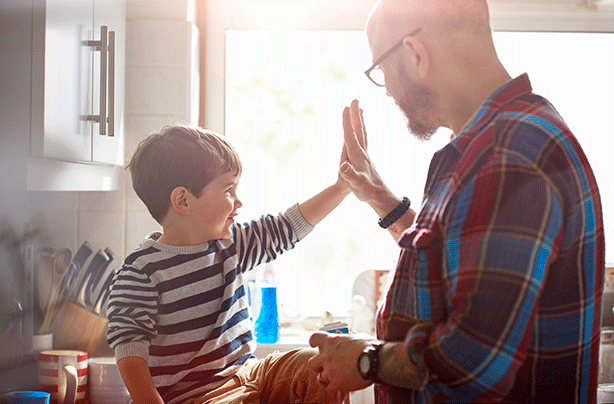
Most children start school when they are four, which is a big milestone for them and for you. Some children are very excited about going to school, but don't be surprised if your child is nervous. Just give them lots of reassurance and focus on how much fun they will have at school. Many children are keen to learn the basics of reading and writing before they start school, and there is a lot you can do at home to help.
'Sometime between the ages of four and six, children develop a chronological understanding. This means that they start to work out the link between letters and sounds,' says Dr Dominic Wyse, author of How to help your child read and write. 'They will also begin to distinguish between words and pictures, which is the foundation of learning to read and write.'
Physical changes
Children of this age grow at a steady rate of about 4cm a year - and sometimes this can seem to happen all at once. If you are worried that your child doesn't seem to be growing, or think they might be overweight, then it's a good idea to check with your health visitor or GP.
Communication
By now, many children can speak clearly and make themselves understood to adults. They may still have trouble pronouncing some sounds - particularly 'th', 'r', 'ch', 'j' and 'l', and it may take another year or two to master these.
Your child is likely to be interested in learning to write, and most children start with their name, so write down the letters for them to copy. They may also begin to recognise a few words in a favourite book. Help them to develop this skill by underlining words with your finger as you read.
Emotional development
At the age of four, most children can show a range of emotions - and can even begin to imagine how others might be feeling. As they begin to develop a stronger sense of self, you will also notice that your child will need more privacy or time to themselves. If you have space, try to give your child a room of their own, or their own special corner where they can play with a friend or with their toys
Learning
There is a great deal of variation among children of this age, but most will be able to draw a picture of a person and some may even write their own name. If they are used to looking at books, some children will pretend to read, and may even be able to recite the words of a favourite book from memory.
When your child starts school they will also get more involved in active play. Improved coordination means that they will now be able to throw and kick - so make time to practise these new skills at home.
Social skills
As your child starts school they will start to make friends and build relationships away from the home. They are likely to have just one or two special friends, usually of the same sex.
At this stage in their development your child is learning how to be a good friend - they have learned how to share, how to consider the feelings of others, and how to listen. But be aware that your child won't always manage to do these things, which may result in squabbles or tantrums.
Challenges
Bed wetting is very common among children aged four and five, so don't worry if your child doesn't always manage to stay dry during the night. Many children of this age are embarrassed if they wet the bed, so try to stay calm and don't tell your child off. You might find it helpful to wake your child to use the toilet before you go to bed. If the problem continues, then talk to your GP or health visitor rule out any underlying cause.
How to help
Think about joining your local library and taking your child on a regular basis. Many libraries run regular story time sessions for different age groups, and your child is certain to find plenty of books that they will enjoy looking at. Try to make these visits as exciting as possible, so that your child comes to associate books with having fun.
Child development stages: Age five
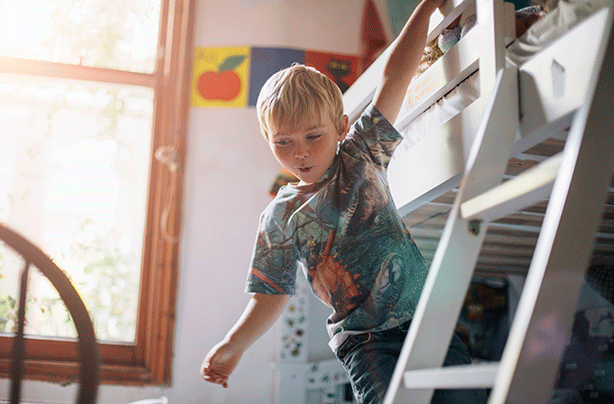
At the age of five, that last stage in the child development stages: ages 1-5 children become much more confident in their abilities. Often this is most obvious in terms of their speech and language development, as the average five year old never stops talking!
Your child will be keen to show off their achievements - so it's important to show in interest in their schoolwork and find a place to display their artwork.
'This is a period of great intellectual growth as your child begins to grasp more abstract ideas, like numbers, time and distance,' says Dr Pat Spungin of parenting website raisingkids.co.uk.
'It's important to realise children develop at different speeds both physically and mentally. It's often difficult to remember this when children are in school with a standardised curriculum.
'Don't worry if at 5 your child seems less 'ready' for school than other children - especially if he is a boy - he has a lot of years ahead of him in which to catch up.'
Physical changes
At five children are physically stronger, can run faster, balance on one leg and throw further. Some children, at this time during the child development stages: ages 1-5, will start to lose their milk teeth at this age.
This is very exciting for your child, especially if they are looking forward to a visit from the tooth fairy. There may be quite a long gap between the milk tooth falling out and the new tooth appearing, and the new tooth may appear crooked at first, but they will usually even out in time.
Communication
By now, many children are able to hold a conversation, and may be able to describe events and repeat favourite stories.
Many children are keen on teaching you the things they have learned, so ask your child what they have been taught at school today, as this is a great way to improve their language skills.
Some children are now ready to start to read at this stage of child development stages: ages 1-5, but it's important not to pressure your child unless they are interested in learning how.
Emotional development
As your child adjusts to school life, you may notice some changes in their behaviour. It's quite normal for children at this stage of the Child Development stages: Ages 1-5 to display some aggressive behaviour at this stage, as they do not yet understand the difference between asking for what they want and taking what they want.
If things don't go their way they may show their frustration by hitting out or kicking. This should become less of an issue as your child becomes more used to being part of a group.
It's around this time during the child development stages: ages 1-5, that you may also notice that your child develops fears - usually of animals like dogs or snakes.
Fear of the dark, ghosts and monsters, thunderstorms, floods or any other events they may have seen on the news are also common. Girls tend to be more fearful than boys, but try to be understanding and reassuring, and bear in mind that most children grow out of these fears fairly quickly.
Learning
By this stage in the child development stages: ages 1-5, you might begin to notice that your child is better at some things than others.
Of course, this is only natural - and may children struggle with certain activities simply because they are not interested in them. So don't worry if it takes your child a while to get the hang of something new.
Just give lots of praise and encouragement as they learn. Some children at this stage of the child development stages: ages 1-5, may now be ready to learn how to tell the time. Explain to your child how a clock works, and explain how you do certain things like go to school or get ready for bed at certain times of the day. You could even buy your child their own wristwatch to encourage them to practise.
Social skills
Children of this age will happily spend long periods of time playing with friends. However, at this stage, children like to be the best and may get upset if they don't win a game or come first. This can cause problems with other children, so it's important to explain to your child that taking part is more important than winning and discourage them from boasting about their achievements to others.
Challenges
Unfortunately bullying is not uncommon at this age, so you should take any changes in your child's behaviour very seriously. Young children may not be able to explain what is happening to them, but if your child is reluctant to go to school, seems anxious or starts wetting the bed, then it's a good idea to have a word with their teacher, just in case another child is bullying them.
How to help
At this age children often develop their own interests - like dinosaurs or dolls - and may start to collect things. It's a good idea to encourage your child and give them lots of opportunity to talk about their hobby, draw pictures or take part in activities that relate to their particular interest.
Trusted, informative, and empathetic – GoodToKnow is the ultimate online destination for parents. At GoodtoKnow, our mission is 'simple': we're trying to make sense of parenthood. On the site, you'll find everything you need for a happy, healthy family life. Our huge archive of content includes more than 18,000 articles and 1,500 how-to videos. These include expert-backed advice features on parenting, dealing with relationship changes after having a baby, self-care for mums and managing your family finances. We also feature tried-and-tested product reviews and buying recommendations for every stage of family life - from prams and Moses baskets to birthday gifts and top toys.